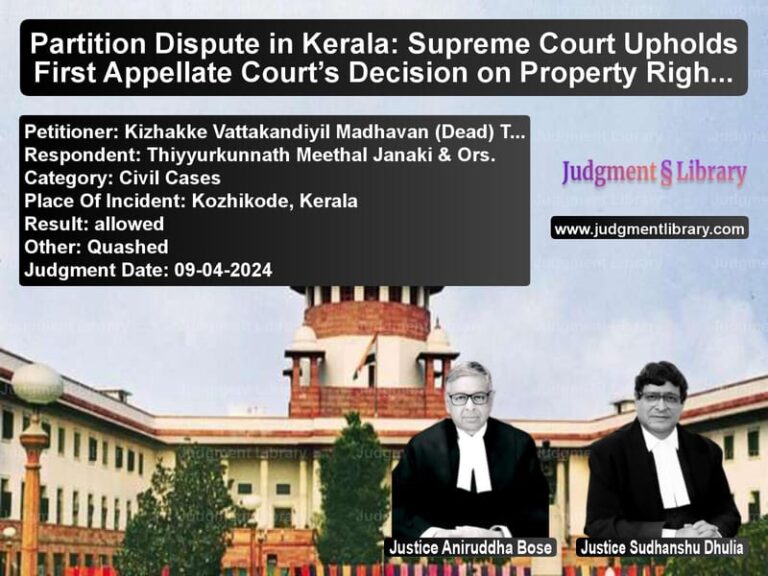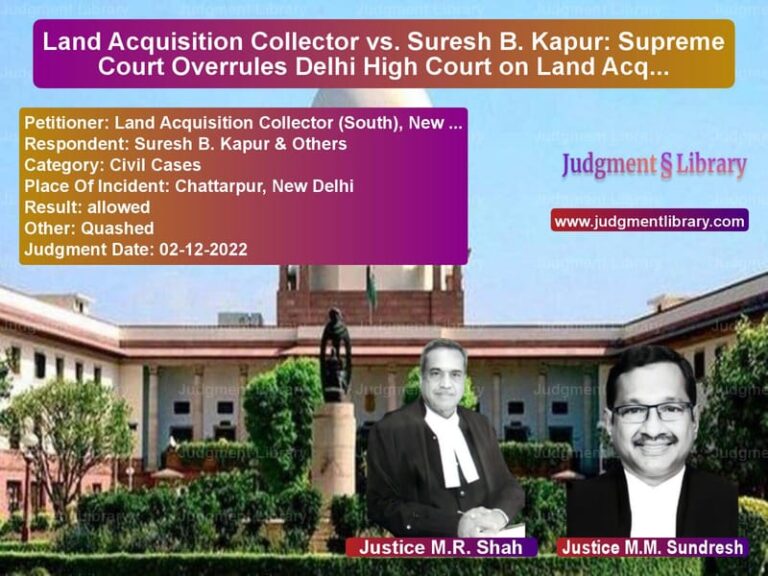NDPS Act Conviction: Supreme Court Reduces Sentence Due to Prolonged Trial
The Supreme Court of India recently ruled in the case of Sk. Sakkar @ Mannan vs. State of West Bengal, modifying the sentence of a convicted individual under the Narcotic Drugs and Psychotropic Substances Act, 1985 (NDPS Act). While upholding the conviction, the Court reduced the sentence in consideration of the protracted trial and the appellant’s conduct.
Background of the Case
The case dates back to November 16, 1997, when a raid was conducted by the police in the forest area of Birbhum, West Bengal. During the operation, an Ambassador car (BRW 312) was intercepted. While three to four individuals managed to escape, two suspects, including the appellant, Sk. Sakkar @ Mannan, were arrested. A total of 11 kgs of ganja was recovered from the vehicle.
Following the seizure, an FIR was registered, and a charge sheet was filed against five individuals, including the appellant. During the trial:
- The Special Judge, Birbhum, convicted the appellant under Section 20 of the NDPS Act and sentenced him to five years of rigorous imprisonment (RI) along with a fine of ₹20,000, with an additional one-year RI in case of default.
- The appellant challenged his conviction before the Calcutta High Court, which dismissed his appeal on December 9, 2009.
- Following this, the appellant approached the Supreme Court, where his sentence was suspended in November 2012 after he had served over two years.
Petitioner’s (Sk. Sakkar @ Mannan’s) Arguments
The appellant’s counsel put forward the following arguments:
- The case suffered from evidentiary flaws, including the absence of independent witnesses.
- Key prosecution witnesses (PW-2, PW-3, and PW-8) were declared hostile, raising doubts about the prosecution’s version.
- Another co-accused, Kalachand Saha, who was arrested alongside the appellant, was not charge-sheeted, which weakened the case against the appellant.
- The appellant had already undergone more than two years of his sentence and had been out on bail for several years without any misconduct.
- Considering the prolonged trial (over 23 years), the Court should take a lenient view on the sentence.
Respondent’s (State of West Bengal’s) Arguments
The prosecution countered these claims by arguing:
- The recovery of 11 kgs of ganja from the vehicle in which the appellant was present was sufficient to prove his guilt.
- The appellant was arrested at the scene, making his presence at the crime location indisputable.
- The absence of independent witnesses did not weaken the case since the seizure and arrest were properly documented.
- The High Court had correctly upheld the conviction, and there was no need for further leniency.
Supreme Court’s Observations
The Supreme Court bench, comprising Justices N.V. Ramana, Surya Kant, and Aniruddha Bose, made the following key observations:
- The appellant was apprehended at the crime scene and was in conscious possession of the contraband, which justified the conviction under Section 20 of the NDPS Act.
- “The appellant’s claim for parity with his acquitted co-accused is also misconceived, for unlike them, he was caught red-handed.”
- Despite the conviction, mitigating factors such as prolonged trial (23 years) and the fact that the appellant had already served a significant portion of his sentence warranted some leniency.
- The Court took note that the appellant had not committed any other NDPS-related offense before or after the case.
The Supreme Court emphasized:
“The ends of justice would be adequately met if the appellant’s sentence is reduced to the extent of the period he has already undergone.”
Final Judgment
The Supreme Court ruled:
- The conviction of the appellant under Section 20 of the NDPS Act was upheld.
- The sentence of five years of RI was reduced to the period of imprisonment already undergone.
- The appellant was directed to pay a fine of ₹20,000 within two months, failing which he would undergo an additional six months of RI.
- The bail bond of the appellant was discharged.
Impact of the Judgment
This ruling has significant implications for criminal law and sentencing:
- Precedent for Sentence Reduction: The ruling provides a reference for courts to reduce sentences in cases where the convict has undergone a prolonged trial and has already served a major portion of their sentence.
- Strict Adherence to NDPS Act: The judgment reinforces that individuals caught with illegal substances will be convicted based on direct evidence.
- Judicial Discretion in Sentencing: The Court highlighted that sentencing should be proportional, considering both deterrence and rehabilitation.
- Encouragement for Legal Reforms: The decision showcases the need for expedited trials in criminal cases, especially under the NDPS Act.
Conclusion
The Supreme Court’s ruling in Sk. Sakkar @ Mannan vs. State of West Bengal strikes a balance between upholding the NDPS Act’s strict provisions and ensuring fairness in sentencing. By reducing the appellant’s sentence to the time already served, the Court acknowledged the undue hardship of a prolonged trial while maintaining the deterrent effect of the law.
Read also: https://judgmentlibrary.com/review-of-criminal-case-transfer-supreme-court-reinstates-delhi-trial/
This judgment serves as a crucial precedent in cases where delays in the justice system affect the proportionality of sentences. It reinforces the principle that punishment should align with the gravity of the offense while considering factors such as trial duration and convict conduct.
Petitioner Name: Sk. Sakkar @ Mannan.Respondent Name: State of West Bengal.Judgment By: Justice N.V. Ramana, Justice Surya Kant, Justice Aniruddha Bose.Place Of Incident: Birbhum, West Bengal.Judgment Date: 03-02-2021.
Don’t miss out on the full details! Download the complete judgment in PDF format below and gain valuable insights instantly!
Download Judgment: sk.-sakkar-@-mannan-vs-state-of-west-bengal-supreme-court-of-india-judgment-dated-03-02-2021.pdf
Directly Download Judgment: Directly download this Judgment
See all petitions in Drug Possession Cases
See all petitions in Bail and Anticipatory Bail
See all petitions in Judgment by N.V. Ramana
See all petitions in Judgment by Surya Kant
See all petitions in Judgment by Aniruddha Bose
See all petitions in partially allowed
See all petitions in Modified
See all petitions in supreme court of India judgments February 2021
See all petitions in 2021 judgments
See all posts in Criminal Cases Category
See all allowed petitions in Criminal Cases Category
See all Dismissed petitions in Criminal Cases Category
See all partially allowed petitions in Criminal Cases Category







